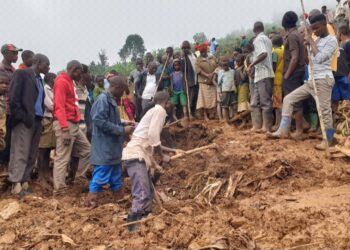A recent study conducted by researchers from Busitema University has unveiled concerning trends in teenage pregnancy in Pakwach District, Uganda, exacerbated by the COVID-19 lockdown. This research highlights a reversal of the previously declining rates of teenage pregnancies, revealing the pandemic’s profound impact on adolescent health and well-being.
Published in the journal *Reproductive Health*, the study utilized interrupted time series analysis to compare teenage pregnancy rates from March 2019 to March 2021. Before the lockdown, Pakwach District had seen a steady decline in teenage pregnancies, with rates decreasing by approximately 0.203 monthly pregnancies. However, following the onset of the COVID-19 lockdown in March 2020, the district experienced a significant spike in teenage pregnancies. In the first month alone, rates surged by 13.9%, translating to an additional 1.53 pregnancies per month compared to pre-lockdown trends.
Dr Wenani, a co-author of the study, reflected on the findings, stating, “The lockdown has not only disrupted education but has also severely affected the sexual and reproductive health of adolescent girls and young women. We anticipated some impact, but its scale was shocking.” His colleague, Jimmy Patrick Alunyo, emphasised the necessity for comprehensive strategies that extend beyond reproductive health, calling for educational and vocational opportunities to mitigate future risks.
These findings resonate with various studies and reports illustrating the adverse effects of the COVID-19 lockdown on adolescent health, particularly concerning teenage pregnancies and domestic violence against girls in Uganda. According to a 2021 report from the Ministry of Health, teenage pregnancy rates surged during the lockdown, with some regions experiencing increases of up to 30%.
A 2021 UNFPA study reported over 644,000 teenage pregnancies between March 2020 and September 2021. Additionally, the Uganda Police Force’s 2021 Annual Crime Report recorded 14,230 cases of defilement, many resulting in teenage pregnancies, marking a 3.8% increase during the lockdown.
Researchers attribute these alarming numbers to various factors, including school closures, reduced access to sexual and reproductive health services like contraceptives, and economic hardships that heightened household tensions, increasing the vulnerability of women and girls to sexual exploitation during the pandemic.
The study’s authors also warn that the rise in teenage pregnancies places additional strain on Uganda’s healthcare system, which was already grappling with the challenges posed by the pandemic and the increasing burden of non-communicable diseases. Teenage pregnancies are linked to higher risks of complications during childbirth, putting vulnerable girls at even greater risk.
The research team advocates for targeted interventions to protect adolescent girls and ensure access to reproductive health services, even during crises. “This pandemic has highlighted the inadequacy of relying solely on schools to safeguard young girls from pregnancy and sexual violence. We must establish systems that provide continuous support, regardless of external circumstances,” Dr. Wenani remarked.
As Uganda and other nations recover from the pandemic, the lessons gleaned from this study should inform future policy. Collaborative efforts among the government, healthcare providers, and community leaders are essential to creating resilient systems that can protect adolescent girls during crises and beyond.
Do you have a story in your community or an opinion to share with us: Email us at editorial@watchdoguganda.com













